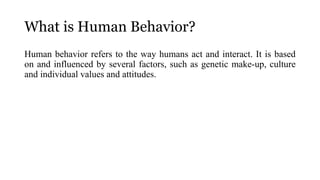Structure of Human behavior.pptx
•Descargar como PPTX, PDF•
0 recomendaciones•38 vistas
Human Behavior and Structure of human behavior
Denunciar
Compartir
Denunciar
Compartir

Recomendados
Recomendados
Más contenido relacionado
Similar a Structure of Human behavior.pptx
Similar a Structure of Human behavior.pptx (20)
Fundamentals of Organizational Behavior by Dr. B. J. Mohite

Fundamentals of Organizational Behavior by Dr. B. J. Mohite
introductionoforganizationalbehavior-161201063151 (1) (1).pdf

introductionoforganizationalbehavior-161201063151 (1) (1).pdf
wDv7Io-fTne7-yKPny537A_aec3859030414bb9b2fd71a04f79c3a1_Introduction-to-OB-Hu...

wDv7Io-fTne7-yKPny537A_aec3859030414bb9b2fd71a04f79c3a1_Introduction-to-OB-Hu...
Último
Último (17)
FULL ENJOY Call Girls In Mahipalpur Delhi Contact Us 8377087607

FULL ENJOY Call Girls In Mahipalpur Delhi Contact Us 8377087607
Jual Obat Aborsi Bojonegoro ( Asli No.1 ) 085657271886 Obat Penggugur Kandung...

Jual Obat Aborsi Bojonegoro ( Asli No.1 ) 085657271886 Obat Penggugur Kandung...
How Multicultural Toys Helps in Child Development.pptx

How Multicultural Toys Helps in Child Development.pptx
Indian Call girl in Dubai 0508644382 Dubai Call girls

Indian Call girl in Dubai 0508644382 Dubai Call girls
Shareholders Agreement Template for Compulsorily Convertible Debt Funding- St...

Shareholders Agreement Template for Compulsorily Convertible Debt Funding- St...
JAIPUR CALL GIRLS SERVICE REAL HOT SEXY 👯 CALL GIRLS IN JAIPUR BOOK YOUR DREA...

JAIPUR CALL GIRLS SERVICE REAL HOT SEXY 👯 CALL GIRLS IN JAIPUR BOOK YOUR DREA...
Bhavnagar Escorts 🥰 8617370543 Call Girls Offer VIP Hot Girl

Bhavnagar Escorts 🥰 8617370543 Call Girls Offer VIP Hot Girl
Enabling Business Users to Interpret Data Through Self-Service Analytics (2).pdf

Enabling Business Users to Interpret Data Through Self-Service Analytics (2).pdf
EV Electric Vehicle Startup Pitch Deck- StartupSprouts.in

EV Electric Vehicle Startup Pitch Deck- StartupSprouts.in
CARA BINA PENDAPATAN PASIF HARIAN RM9000 BERMODALKAN RM30 DI TDC

CARA BINA PENDAPATAN PASIF HARIAN RM9000 BERMODALKAN RM30 DI TDC
EXPERIENCE THE FUTURE OF WORK FOR FUTURE OF BUSINESSES

EXPERIENCE THE FUTURE OF WORK FOR FUTURE OF BUSINESSES
Structure of Human behavior.pptx
- 1. What is Human Behavior? Human behavior refers to the way humans act and interact. It is based on and influenced by several factors, such as genetic make-up, culture and individual values and attitudes.
- 2. Structure of Human Behavior Human behavior is a complex interplay of three components: 1. Actions 2. Cognition 3. Emotions
- 3. Actions are Behavior An action denotes everything that can be observed, either with bare eyes or measured by physiological sensors.
- 4. Cognitions are Behavior Cognitions describe thoughts and mental images you carry with you, and they can be both verbal and nonverbal.
- 5. Emotions are Behavior a complex state of feeling that results in physical and psychological changes that influence thought and behavior
- 6. Fundamental Concepts of Organizational Behavior • The Nature of People 1. Individual Difference 2. Perception 3. A Whole Person 4. Motivated Behavior 5. Desire For Involvement 6. Values of the Person • The Nature of Organization 1. Social system 2. Mutual Interest 3. Ethics
- 7. Why is Organizational Behavior Important? 1. Contributes to personal growth 2. It helps managers to motivate their sub-ordinates 3. Reduce the chances of conflicts. 4. Increases Organizational efficiency. 5. Improves the satisfaction of employees 6. Develops positive attitude 7. Facilitates Management
- 8. Scope of Organizational Behavior 1. Individual behavior 2. Inter-Individual Behavior 3. Group Behavior
- 9. Individual behavior • It is the study of individual’s personality, learning, attitudes, motivation, and job satisfaction. In this study, we interact with others in order to study about them and make our perception about them.
- 10. Inter-Individual Behavior • It is the study conducted through communication between the employees among themselves as well as their subordinates, understanding people’s leadership qualities, group dynamics, group conflicts, power and politics.
- 11. Group Behavior • Group behavior studies the formation of organization, structure of organization and effectiveness of organization. The group efforts made towards the achievement of organization’s goal is group behavior. In short, it is the way how a group behaves.